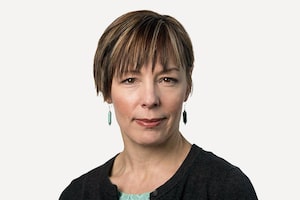A bouquet of flowers outside the Willingdon Care Centre, confirmed to be the location of the worst COVID-19 long-term care outbreak in the province, in Burnaby, B.C., on Oct. 20, 2021.Rafal Gerszak/The Globe and Mail
At least 59 seniors in British Columbia have died of COVID-19 amid outbreaks at long-term care facilities during the fourth wave of the pandemic, leading the province’s independent seniors-services watchdog to call for speedier delivery of vaccine boosters.
B.C. is now racing to complete its rollout of third COVID-19 vaccine shots for residents and staff in long-term care by the end of October. The province’s booster campaign started weeks behind those in Ontario and Alberta.
Since Aug. 1, there have been outbreaks at 39 long-term care facilities in B.C., despite the vast majority of residents being fully vaccinated.
What you need to know about COVID-19 immunity, third doses and booster shots
“It is becoming clear, as we are seeing these outbreaks and fatalities in these outbreaks, that the booster shots are necessary. And given the ability we now have to get a lot of shots out quickly, we should be going at full speed to get our residents in long-term care booster shots,” said Isobel Mackenzie, the province’s Seniors Advocate, who monitors issues affecting older people and reports findings to B.C. Health Minister Adrian Dix. “That could help blunt the impact of wave four on long-term care.”
In an interview, Mr. Dix defended the timing of the province’s booster shots, saying the vaccine program has been robust. Across B.C., 89.4 per cent of eligible residents have had their first dose of a COVID-19 vaccine.
“There was always urgency here, and the urgency isn’t just about long-term care,” Mr. Dix said. He added that public health officials are working to get this round of booster shots delivered to hundreds of care facilities before Health Canada approves vaccines for children. That approval, which is expected to come in November, will cause some vaccine resources to be redirected for the purpose of inoculating up to 340,000 five-to-11-year-olds around the province.
One of the worst outbreaks in B.C.’s long-term care sector currently is at the Willingdon Care Centre in Burnaby, a facility that did not detect a single COVID-19 case until Sept. 28. Now, 80 residents at the 95-bed facility have tested positive for the virus, 13 seniors there have died and 24 staff have tested positive.
The Fraser Health Authority declared the outbreak at Willingdon the same day Canada’s National Advisory Committee on Immunization (NACI) called for seniors in long-term care homes to be “immediately” provided with booster shots.
COVID-19 booster shots not yet needed for most Canadians, health experts say
Opinion: Is a third COVID-19 shot the charm?
Some provinces, including Alberta and Ontario, started delivering third shots before the NACI recommendations, based on evidence that showed the protective benefits of the vaccines in the long-term care population were declining.
Canadian studies have shown that even though many people in long-term care had good initial antibody responses to two doses of COVID-19 vaccines, the majority of residents did not have detectable levels of antibodies against the Delta variant of the coronavirus six months later.
Ontario announced its rollout in August. By Oct. 13, roughly 90 per cent of long-term care residents who were medically able to take third doses had rolled up their sleeves, resulting in a marked decrease in care-home outbreaks. Alberta began offering third doses to seniors living in congregate care facilities on Sept. 1.
But B.C. didn’t start to deliver third shots – with a few exceptions in response to outbreaks – until the NACI recommendations were published on Sept. 28. To date, it has administered between 9,000 and 10,000 booster shots in long-term care. There are roughly 30,000 residents and almost 50,000 workers in the sector.
While B.C. earned accolades for its swift action at the start of the pandemic to blunt the impact of COVID-19 in long-term care, critics say the response to the fourth wave has been unaccountably slow.
Terry Lake, chief executive officer of the BC Care Providers Association, a continuing-care industry group, said the province didn’t need to wait for NACI to respond. “Alberta and Ontario are well ahead of the game in terms of the third shot. It has made a big difference in terms of outbreaks,” he said. “That’s why we advocated for speeding it up.”
Some of the province’s health authorities initially projected that it would take until mid-December to deliver third shots in long-term care, and Mr. Lake said it is “great news” that B.C. is now on pace to beat that target. But, he added, the outbreak at Willingdon shows just how dangerous the Delta variant can be.
“Willingdon is a very well-run facility. They had no COVID in the first three waves. Once immunity started to wane, unfortunately, COVID got into the home and it has spread like wildfire. With earlier boosters, this could have been avoided,” he said.
We have a weekly Western Canada newsletter written by our B.C. and Alberta bureau chiefs, providing a comprehensive package of the news you need to know about the region and its place in the issues facing Canada. Sign up today.
 Justine Hunter
Justine Hunter